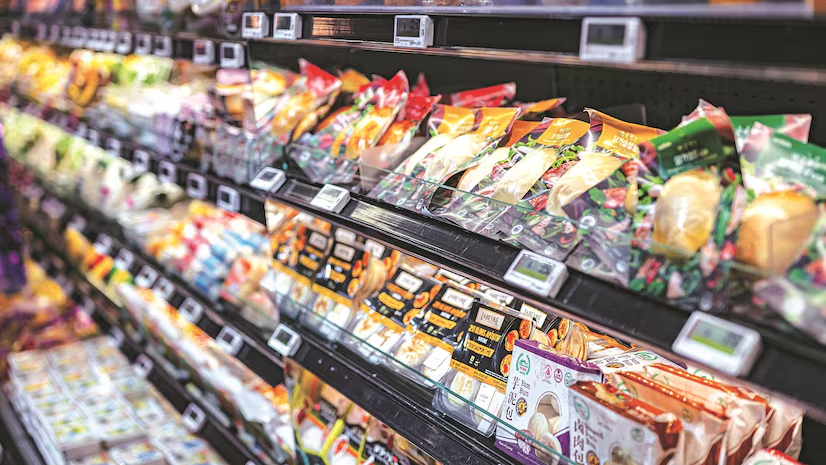Tiny plastic pieces are now everywhere, even in our food. When we eat, we don’t think about it, but these tiny plastics can be there. Studies show lots of foods have these plastics, and that’s worrying for our health.
To fix this, the food safety people in India (FSSAI) are starting a big project. They want to stop these tiny plastics from getting into our food. This is happening now because people are worried about what they eat. Let’s see what FSSAI is doing and how it helps.

Table of Content:
What Are Microplastics?
Microplastics are very small pieces of plastic, less than five milli-meters long. They come from different places:
- Primary microplastics: These are tiny plastic pieces made on purpose. You find them in things like makeup, toothpaste, cleaning stuff, and even some products that scrub things.
- Secondary microplastics: These come from big plastic things breaking down. For example, plastic bags, water bottles, and fishing nets break into tiny pieces because of sunlight, heat, and rubbing.
Because plastic doesn’t break down like food or plants, these tiny pieces stay around for many, many years. They get into our water, dirt, and air. Eventually, they get into the food we eat and then into our bodies
Overview of FSSAI’s New Initiative
Therefore, India’s food safety group, FSSAI, has started a big project to fight microplastics in food. Indeed, this shows they want to protect people’s health.
Furthermore, the project has three main parts:
- Teaching People: FSSAI will give people easy-to-understand information about tiny plastics in food. Knowing about microplastics will help people pick healthier foods. People can also ask food companies to use less plastic.
- Research: FSSAI is working with scientists to find out how much tiny plastic is in our food. They want to know where the plastic is coming from and how it gets into food. This research will help them make better plans to keep our food safe.
- Rules: FSSAI will make rules for food companies to use less plastic. These rules will help stop plastic from getting into food when it is packed or made. The rules will make sure companies use cleaner ways to make food.
How do microplastics enter the food chain?
Tiny plastic in the food chain affect what we eat. This is worrying because it might be bad for our health. To fix this problem, we need to know how these tiny plastic pieces get into our food in the first place.
- Packaging:
- Food packaging (bags, containers, bottles)
- Product packaging (cosmetics, electronics, household items)
- Shopping bags
- Household Items:
- Storage containers
- Cleaning supplies (bottles, sponges)
- Vegetable Polythene Bag
- Personal Care:
- Toothbrushes AND
- Personal hygiene products
- Medical Field:
- Syringes
- Medical Tools
- Medicine Wrapper
Essentially, from the moment we wake up to the moment we go to sleep, we interact with numerous plastic products.
The Impact of Microplastics on Human Health
1. Digestive System Issues
- Tiny plastic don’t break down in our bodies.
- They can build up in our stomachs and intestines, causing irritation and swelling.
- This might lead to stomach problems over time.
2. Toxic Chemical Exposure
- Tiny Plastic often carry bad chemicals like BPA and heavy metals.
- These chemicals can mess with our hormones, hurt our ability to have children, and possibly cause serious illnesses like cancer.
3. Cell Damage and Immune System Effects
- Tiny plastic can get inside our cells and trigger our immune system.
- This can lead to damage in our tissues and ongoing swelling, which could increase the risk of heart problems and other health issues.
4. Potential Impact on the Nervous System
- Some tiny plastic have toxic things added to them that might affect our brains.
- Scientists are looking into whether these plastics could affect how our brains develop and work.
The Impact of Microplastics on Animals Health
1. Physical Harm
When animals eat microplastics, the pieces can get stuck in their stomachs. This blocks their digestion, so they can’t get nutrients from real food. Over time, they can starve. For example:
- Sea turtles think plastic bags are jellyfish, their favorite food.
- Birds accidentally feed microplastics to their babies, who can’t digest them.
2. Toxic Chemicals
Microplastics act like sponges, soaking up harmful chemicals like pesticides. When animals eat these plastics, the chemicals enter their bodies. This can:
- Mess up their hormones.
- Damage organs like the liver and kidneys.
- Make their immune systems weaker, so they get sick more easily.
3. Harm to Ecosystems
Microplastics don’t just hurt one animal—they harm entire ecosystems. For example:
- Small fish eat microplastics, and bigger fish eat those small fish. The toxins move up the food chain.
- Over time, this can reduce animal populations and upset the balance of nature
Microplastics don’t just hurt animals—they can also affect humans. Many animals harmed by microplastics are part of the food chain that people rely on. By hurting animals, microplastics can also harm human health and the environment.
Steps being taken by FSSAI to address the issue

1. Government Regulations and Policies
- The government (like the FDA and EPA) is studying microplastics in food chain and water.
- They’re also trying to make stronger rules about plastic waste, like banning tiny plastic beads in makeup and limiting single-use plastics.
2. New Ideas from Companies:
- Companies are trying to find new ways to package food, like using materials that break down naturally, glass, or metal.
- Some food makers are changing how they make food to use less plastic.
3. Advanced Water Filtration Technologies
- New water filters, like reverse osmosis and activated carbon, can take out microplastics.
- Cities and people are using these filters to get cleaner drinking water.
4. Public Awareness and Consumer Action
- Use glass, metal, or ceramic instead of plastic.
- Don’t microwave food in plastic.
- Buy from companies that use eco-friendly packaging.
- Recycle and use less single-use plastic.
- Filtering tap water to reduce microplastic exposure.
Public response and support for the initiative

India’s food safety group (FSSAI) is trying to tackle microplastics, but they face some problems:
- We need more information: We don’t know exactly where all the microplastics are coming from in India. It’s hard to check all the different foods and places they come from.
- Testing is tricky: The ways we test for microplastics are still being improved. This can slow down finding bad food.
- Getting companies to change: Some food companies might not want to change because it costs money or is difficult.
- Teaching everyone: We need to teach people about microplastics, and we need to do it in a way that everyone understands.
- Global and local work: The world is working to reduce microplastics. India must also build the systems to keep its food safe.
Challenges faced in implementing the initiative
India’s trying to make our food safer from tiny plastic bits (microplastics). It’s a good idea, but it’s going to be hard. Here’s why:
It is important to provide easy to understand information in many different languages.
- Data Gap: More Information Needed We lack enough details on microplastic levels in Indian food. This makes it hard to create targeted solutions. More comprehensive research is essential to pinpoint sources and quantify contamination. Accurate data is crucial for developing effective regulations and mitigation strategies.
- Complex Food System: Monitoring Is Tough: India’s extensive food supply chain makes it tough to monitor microplastics. Regional variations in food production and distribution necessitate tailored monitoring approaches. The sheer volume of food products requires efficient and scalable testing methods.
- Technology Limitations: Testing Needs Improvement: Current methods for finding microplastics need more work. This can cause inaccuracies and delays. The need for faster, more reliable testing technologies is critical for timely intervention. Advancements in filtration and analytical techniques are vital to improve detection efficiency.
- Industry Resistance: Getting Companies On Board: Food companies may be hesitant to adopt new, potentially costly, microplastic reduction measures. Strong regulatory enforcement and incentives are needed to ensure industry compliance. Collaborative efforts can help develop cost-effective solutions for manufacturers.
- Public Awareness: Educating Consumers Is Key. We need strong campaigns to inform people about the risks of microplastics. Information must be accessible and understandable across diverse linguistic and cultural backgrounds. Empowering consumers with knowledge can drive demand for safer food practices
Future Outlook and Potential Solutions
- Leading the Way: The FSSAI’s work is a great start. It sets an example for other countries and organizations to take action.
- New Materials: Biodegradable Solutions: Scientists are working on new materials that break down naturally. These could replace the plastic we use for food packaging, which would greatly reduce plastic waste.
- Educating Everyone: Public Awareness Matters: We need to teach people about microplastics and how to reduce plastic use. When everyone understands the problem, we can work together to solve it.
- Cleaner Water: Advanced Filtration: New water filters can remove tiny plastic from our water. This helps prevent microplastics from getting into our food in the first place.
- Working Together: Collaboration Is Key: Scientists, businesses, and governments need to work together. By sharing knowledge and resources, we can find the best ways to fight microplastics.
- A Cleaner Future: While it won’t be easy, we can create a future with less plastic pollution.
Conclusion
Microplastics in food chain are a growing public health concern. From seafood to bottled water, plastic particles are making their way into our bodies. While the long-term effects are still being studied, early research suggests significant health risks. Fortunately, governments, industries, and individuals are taking action to reduce plastic pollution. Stricter regulations, technological innovations, and consumer awareness are key to tackling this issue. Completely getting rid of microplastics in food might not happen, but we can reduce exposure for a healthier future. Fighting microplastics needs everyone to work together. By combining our efforts and maintaining consistent action. we can make collective progress that benefits everyone
